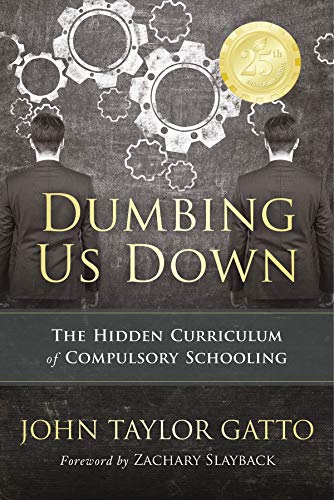Dumbing Us Down - 25th Anniversary Edition: The Hidden Curriculum of Compulsory Schooling by John Taylor Gatto Link to heading
Summary Link to heading
“Dumbing Us Down - 25th Anniversary Edition: The Hidden Curriculum of Compulsory Schooling” by John Taylor Gatto critiques the traditional education system in the United States. Gatto, an experienced teacher and education reform advocate, argues that the compulsory schooling system stifles creativity, critical thinking, and genuine learning. The book presents the idea that the education system is designed more to produce conforming citizens rather than independent thinkers. Through a series of essays and speeches, Gatto illuminates the “hidden curriculum” that promotes passivity, fosters a lack of confidence, and separates learning from life experiences. He challenges the effectiveness and purpose of standardized schooling and suggests that real education requires more personalized, self-directed approaches.
Review Link to heading
“Dumbing Us Down” has been influential in discussions about educational reform. One of its strengths is Gatto’s ability to draw from his direct experiences as a public school teacher, providing concrete examples and anecdotes to support his arguments. The book has been praised for its thought-provoking critique and its persuasive argument for reevaluating how we educate children. However, some critics feel the book could benefit from offering more concrete solutions or alternatives to the problems it highlights. Despite occasionally being viewed as too radical, its bold stance has inspired many educators and parents to reconsider the role and structure of schooling.
Key Takeaways Link to heading
- The Hidden Curriculum: Schools often teach conformity, obedience, and rote memorization rather than critical thinking, creativity, or self-reliance.
- Education vs. Schooling: There’s a distinct difference between true education, which is self-motivated and explorative, and institutional schooling, which Gatto sees as systematically stunting intellectual growth.
- Individuality: A significant consequence of compulsory schooling is the loss of individual thought and the marginalization of personal talents and interests.
- Alternative Education: Gatto calls for educational alternatives that promote experiential learning and personalized instruction.
Recommendation Link to heading
“Dumbing Us Down” is particularly beneficial for educators, policymakers, parents, and anyone interested in the philosophy and practice of education. Those questioning the effectiveness and purpose of traditional schooling or looking for inspiration to explore alternative educational methods will find it thought-provoking. Gatto’s work helps initiate important conversations about how education can better serve individual learners and society as a whole.
